Dental Implants Corpus Christi
Creating Beautiful Smiles That Last for Decades
Tooth loss can make it harder to eat your favorite foods, speak clearly, and smile with confidence. Traditional dentures and bridges can fill in the gap, but they only replace the top portion of missing teeth. Dental implants, on the other hand, go one step further and restore the missing tooth root as well, making them the most comprehensive tooth replacement option available today. Are dental implants the right choice for rebuilding your smile? Find out by calling our periodontal office and scheduling a consultation with Dr. Garcia today to discuss tooth replacement with dental implants in Corpus Christi, TX.
Why Choose South Texas Periodontics & Implants for Dental Implants?
- Highly Trained Board-Certified Periodontist
- All-on-4 Dental Implant Treatment Available
- Friendly and Knowledgeable Team
What Are Dental Implants?

A dental implant is a screwlike post normally made out of titanium or zirconium. They’re made to be inserted into the jaw and bond with the surrounding bone tissue. This allows them to give your new teeth stability and chewing strength that’s comparable to your natural teeth. A single dental implant post can support a dental crown to replace one tooth; meanwhile, multiple implants can be combined with bridges or dentures to replace multiple teeth.
The 4 Step Dental Implant Process

Dental implants are a remarkable treatment for replacing missing teeth, providing a durable and natural-looking solution. At South Texas Periodontics & Implants, we follow a streamlined, four-step process to ensure your implant procedure is smooth and successful. From your initial consultation to the placement of your final restoration, Dr. Garcia tailors every step to meet your needs. This meticulous process is all to deliver a functional and highly aesthetic result that will leave you smiling. If you’re curious about what to expect during your treatment, read more below. You’ll see how our team can transform your smile with comfort and precision.
Initial Dental Implant Consultation

The process begins with a comprehensive consultation with Dr. Garcia. During this visit, our team will assess your oral health, take 3D scans of your mouth, and determine if dental implants are the right fit for your situation. If necessary, we’ll discuss treatments like bone grafting to prepare your jaw for implants.
This is also the perfect time to ask questions and discuss your vision for your smile. Our goal is to create a personalized treatment plan that meets your needs and sets your procedure up for success. Dental implants are one of the most successful treatments in dentistry, and it all begins with a rigorous and thorough planning stage!
Dental Implant Surgery

After creating your treatment plan and setting up your procedure, the next step is surgery. However, it’s not nearly as stressful as you might think! Using our initial scans of your mouth, we can create a guide that slips over your teeth and jaw. This makes it easy to precisely mark the places where the titanium implants will go into your jawbone.
Once you’re comfortable, Dr. Garcia will begin by numbing the area where your implants will be placed. He’ll use the guide to insert the implant fixtures with specialized tools. Once they’re covered with healing caps, you’ll be ready for the next step!
Dental Implant Osseointegration & Abutment Placement

Over the next three to six months, your mouth will undergo a fascinating healing process called osseointegration. This is where your new implants fuse with your jawbone, creating a strong, stable foundation for a custom-made restoration. While this is a lengthy step, it’s critical for the long-term success of your implants.
Once healing is complete, we’ll attach small connector pieces called abutments to the implant fixtures. These ensure your final restorations fit securely and blend naturally into your smile.
Delivery of Dental Implant Restorations

The final step is the exciting part—receiving your custom dental restoration! Whether it’s a crown, bridge, or denture, your prosthetic will be designed to match the size, shape, and color of your natural teeth.
Dr. Garcia will securely attach your restoration to the abutment, giving you a fully restored smile that’s as functional as it is beautiful. At our Corpus Christi office, we ensure your new teeth feel comfortable and look just the way you envisioned them, so you can eat, speak, and smile with complete confidence.
Benefits of Dental Implants

Deciding how to best restore your smile is not a choice you should make lightly. While there are many options available regarding tooth replacement, there is only one that offers countless benefits that cannot be matched with more traditional solutions. The benefits of dental implants range from increased longevity to improved oral health, and after reviewing the following advantages, you’ll learn why so many Americans are choosing dental implants to rebuild their smiles.
Day-to-Day Benefits

- Ability to eat the foods you love - Dental implants are permanently anchored to your jaw. That means that, unlike traditional dentures, you won’t have to worry about your new teeth slipping when you’re trying to eat and speak.
- Reduced risk of tooth decay & gum disease – Instead of worrying about cleaning a separate prosthetic, you can clean your dental implants using the same oral hygiene products. The only difference is to use non-abrasive toothpaste, as this will avoid scratches to your restorations.
- Create a more youthful appearance – Because of how dental implants fit within the bone structure, they offer continuous stimulation to prevent facial sagging. This, as a result, helps to keep your smile and face more youthful over time.
Health Benefits

- Your healthy teeth remain in place – When tooth loss occurs, nearby healthy teeth may try to shift to cover the space. However, dental implants help to avoid the potential of dental drift and the possibility of future orthodontic treatment.
- Continuous jawbone stimulation – Since the implants are inserted directly into your jawbone, they can provide the stimulation that normally comes from your natural teeth. This lowers the risk of bone loss and helps you maintain a stronger, healthier jaw.
- No need for tooth altering – An implant dentist will only work within your gums and jawbone, never will they touch healthy teeth. Fixed bridges may require altering abutment teeth to serve as anchors for the prosthetic, but dental implants allow you to keep more of your natural smile.
Long-Term Benefits

- Proven success rate – Patients who are leery about the success of dental implant placement will be pleased to learn that when placed by a skilled professional, these prosthetics have a 90-95% success rate upon initial placement.
- Can last for decades – Dental implants can last for decades – or even the rest of a patient’s life – with minimal maintenance.
- You can save money – Any type of tooth replacement will be costly; however, if you want to save more in the long run, there’s no better option than dental implants. As a cost-effective investment, you can avoid the high cost of denture adhesives over time as well as frequent replacements and adjustments.
Who Dental Implants Can Help

One of the great things about dental implants is that they can be used in the majority of tooth loss scenarios. Whether you have lost one, several, or all of your teeth, you can have your smile transformed. However, not everyone makes a good candidate right away. Here’s what you should know.
Who Is a Good Candidate for Dental Implants?

If you are a healthy adult, there is a good chance that dental implants will work for you! Here are the three main things we consider when determining if you are a good candidate for the procedure:
- Good Overall Health: Placing dental implants requires a surgical procedure, so you need to be in good enough health to undergo minor surgery.
- Great Oral Health: If you have an issue like a cavity or gum disease, your dental implants are more likely to fail, so they’ll need to be addressed first.
- Adequate Jawbone Density: You need to have a strong jawbone to support dental implants for your treatment to be successful.
If you don’t make a good candidate for dental implants right away, don’t fret. They could still be an option for you in the future. Many patients end up needing to complete preliminary treatments, like extractions, gum disease therapy, or bone grafting, before getting dental implants. We can help to schedule these procedures to get you on track towards restoring your smile.
Missing One Tooth

One dental implant post can be placed in the gap left by a missing tooth. Once the area around it has healed, it can support a dental crown that has been personalized to blend in with the rest of the patient’s smile. Implant crowns are often recommended over traditional bridges because they don’t require the removal of enamel.
Missing Multiple Teeth

When three or more teeth in a row are missing, they can be replaced simultaneously with two implant posts and a bridge. The crowns at either end of the bridge will rest on the implant posts while the pontics (false teeth) between them fill in the rest of the gap.
Missing All Teeth

When all of the teeth in a single arch are missing, there’s no need to get a dental implant post for each of them. Four to six implants can be placed throughout the jaw to support a full set of new teeth. Unlike traditional dentures, an implant denture can be designed to stay in the mouth permanently, letting you brush and floss your new teeth like you would your original ones.
Alternatively, you may be a candidate for All-On-4 dental implants! This method is ideal for patients who have inadequate jawbone density. As the name implies, this option anchors a full denture securely in place with just four strategically placed dental implants.
Learn More About All-On-4 Dental Implants Learn More About Implant Dentures
All-on-4 Dental Implant Dentures

The All-on-4 technique makes it possible to replace an entire row of teeth with only four implants. Said implants are inserted at angles that allow them to take advantage of the areas of the jaw where bone density is higher. This approach means that even patients with bone loss might be able to get dental implants right away. Another benefit of All-on-4 is that in many cases, a temporary denture can be placed on the same day as the implant surgery so that you aren’t left waiting for new teeth.
Understanding the Cost of Dental Implants

Dental implants have all sorts of benefits because they replace the roots of the missing teeth – not just the chewing surfaces. However, many people worry about how much the procedure costs. Everyone’s case is different, so the cost of dental implants can vary quite a bit from patient to patient. An estimate will be provided at your initial consultation so that you can start planning ahead of time and don’t run into any surprises. Until then, here are some things to take into consideration.
Preliminary Treatments & Dental Implant Surgery
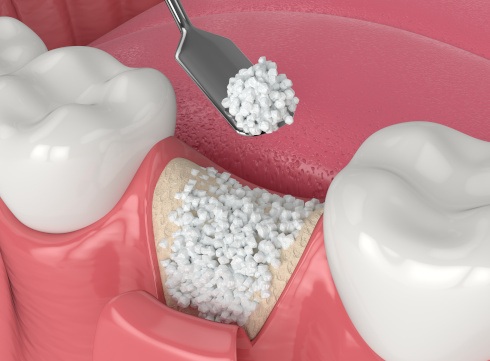
In some cases, patients need to undergo preliminary procedures before they are able to get dental implants. This can include things like gum disease treatment, tooth extractions, bone grafting, and other services. It is important to consider the cost of these procedures if they apply to you. Fortunately, the cost of many preliminary procedures is often partially covered by dental insurance. Just keep in mind that every plan is different, so it is best to contact your provider ahead of time to confirm your coverage.
The Parts of Your Dental Implant
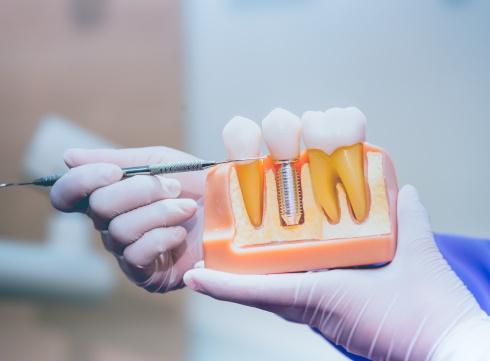
There are several factors that play a role in the cost of your dental treatment. Here are the main ones that are considered:
- Number of Implants: The number of teeth that you are missing and where they are located in the mouth will determine the number of dental implants you require. The more dental implants, the higher the cost.
- Type of Restoration: Dental crowns, bridges, and dentures are all at different price points. In most cases, the smaller the restoration, the lower the cost.
- Materials Used: Dental implants are usually made from surgical titanium. However, they can also be crafted from zirconia.
- Brand of Implants: Just like other products, dental implants come from a variety of manufacturers. This will influence the cost.
How Dental Implants Can Save You Money
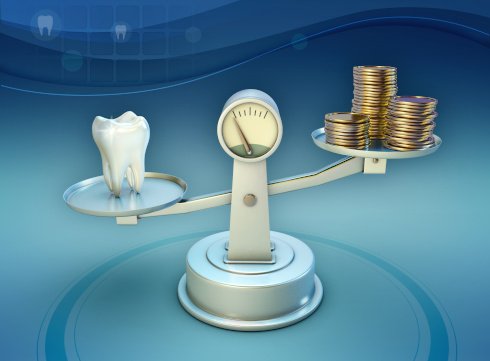
It is tempting to try to save money on your replacement teeth by choosing another option, like dentures. Traditional dentures are effective at replacing teeth, and they are a great option for some, but they don’t provide the same benefits that dental implants do. Dental implants can actually help you save money in the long run because you won’t have to pay for frequent repairs and replacements every few years. Buying adhesives and soaking solutions isn’t necessary either. Because dental implants help to prevent serious oral health issues from developing, you may be able to avoid costly restorative treatments down the line.
Does My Dental Insurance Cover Dental Implants

In most situations, dental insurance doesn’t cover the cost of dental implants. However, there are some exceptions to keep in mind. Parts of the final restoration and preliminary procedures are often covered. However, every plan is a little bit different, so it is best to double-check with your provider ahead of time. We would also be happy to help you with this process. At South Texas Periodontics & Implants, we are willing to accept any dental insurance plan that offers coverage for periodontal treatment and dental implant care.
How to Make Dental Implants Affordable

If you don’t have dental insurance, this doesn’t mean that you will be left completely on your out. With proper credit approval, patients can get their dental implants for as low as $199 a month! We are also happy to accept payments through CareCredit – a third-party financing company that can split the cost of your treatment into manageable monthly installments with little to no interest. To learn more about your financial options, don’t hesitate to reach out to one of our friendly team members.
Advanced Dental Implant Technology
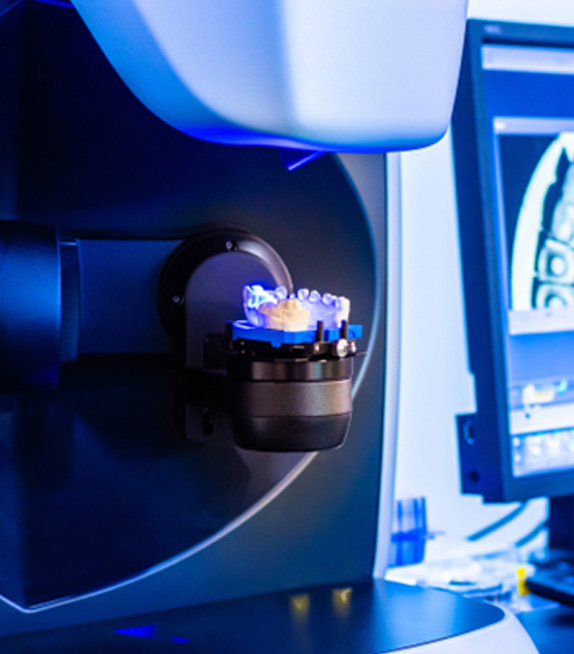
At South Texas Periodontics & Implants, our team is committed to achieving the best possible results for every single treatment that we conduct. That’s why we’ve invested in some of the latest technology available, from advanced cone beam 3D imaging to guided dental implant surgery. With these instruments, our procedures are more detailed and precise, and with that enhanced precision comes longer lasting results and a more comfortable overall experience. You can learn more about the advanced technology we utilize below, or feel free to ask us about it at your initial consultation.
Cone Beam 3D Imaging
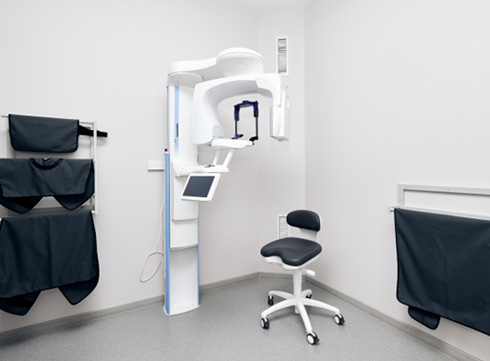
Our cone beam 3D scanner, or CBCT for short, is an advanced digital imaging device that allows our team to capture a full, detailed blueprint of your entire facial structure. All you need to do is rest your chin on a small platform and press your forehead up against a plate. Within about 30 seconds, the scanner will rotate around your head 360 degrees and capture hundreds of two-dimensional X-ray images from countless angles. Those images are then reconstructed to create a complete 3D model of your head and neck area to show our team the location of your facial bones, nerves, sinuses, and more.
The detailed scan captured by the CBCT imaging device can then be utilized by Dr. Garcia to create a detailed treatment plan for the placement of your dental implants.
Guided Dental Implant Surgery
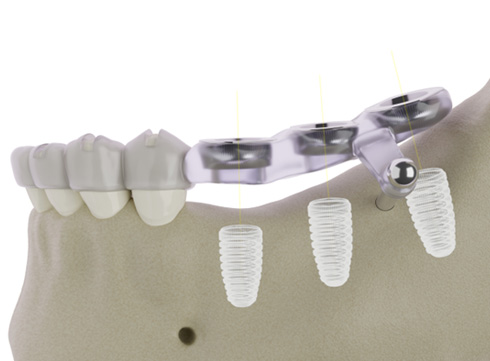
There are two techniques providers can use for the surgical placement of your dental implants, freehand placement, which is where your provider takes an educated guess on the best place to secure your dental implants. The other technique is guided dental implant surgery. This involves creating a custom surgical guide based on your CBCT scan that shows your periodontist in Corpus Christi the ideal places and depths within the jawbone to place your dental implants.
Guided implant surgery leads to better outcomes, including a lower risk of dental implant failure and post-operative complications.
Digital Impression System
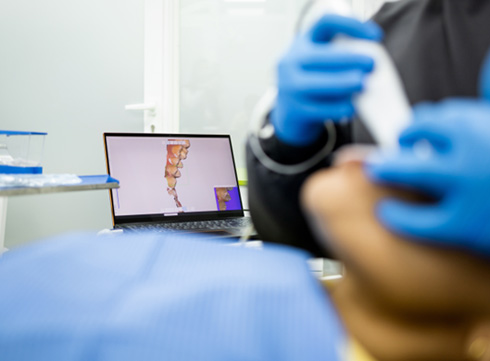
Instead of utilizing putty to capture an impression of the gums after the dental implants are placed, our team will use a special, more precise device called a digital impression system. This technology uses a hand-held wand with a camera on the end of it to scan the mouth and create a photorealistic digital rendering. Our team can then send this image off to a dental laboratory or partnering provider to craft your prosthetic to fit perfectly and closely resemble your natural teeth.
Dental Implants Post-Op Instructions
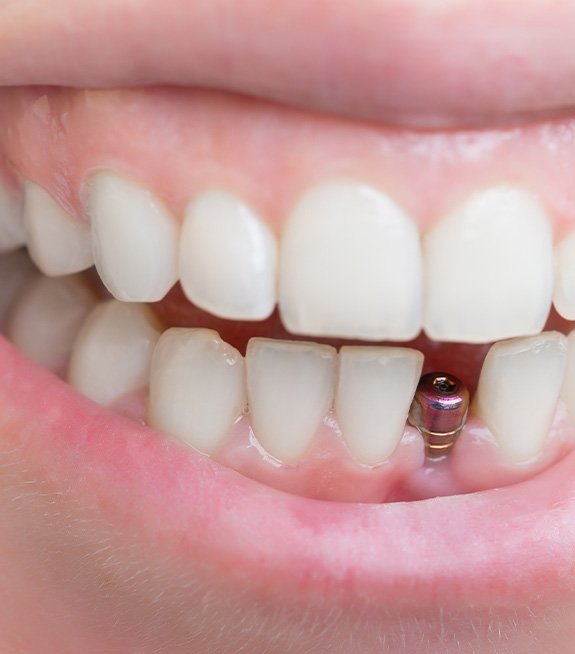
Many patients worry that getting dental implants involves a difficult recovery, but that’s not usually true! Our team is here to help you understand more about what symptoms you might expect and what symptoms are considered normal so that you can set your mind at ease. However, if you experience intense pain or other adverse effects not mentioned here, please contact us and let us know so that we can ensure that you can heal as intended.
Continue reading to learn more about what you might anticipate as you recover from your dental implant procedure!
What to Do Directly After Dental Implant Surgery

After your appointment, your mouth forms a blood clot over the surgical site to protect the underlying tissues and prevent infection. The following tips can help you avoid damaging or dislodging it:
- Try not to spit forcefully. Instead, use tissues or swallow your saliva.
- Drink fluids directly from the glass. Sucking on a straw can harm the blood clot.
- Quit smoking, at least for the first 24 hours.
- Don’t touch the site with your fingers, tongue, etc.
Common Side Effects When Recovering from Dental Implant Placement
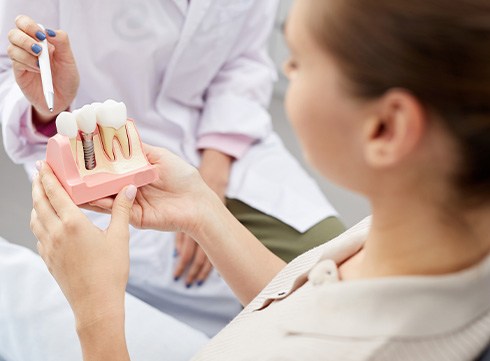
Having mild to moderate symptoms in the first few days following your implant procedure is normal. Some common side-effects you might experience include:
- Intermittent oozing. You can slow the flow by placing clean, folded gauze over the wound and biting down gently. Call our office for guidance if your bleeding persists or worsens after a few days.
- You’ll likely have some swelling at the implant site for the first 72 hours that can affect your cheeks and jaw. Pressing a warm or cold compress to that side of your face can provide some temporary relief.
- If you’re prescribed pain medications, take them exactly as directed. Otherwise, taking ibuprofen or Tylenol can usually safely ease your aches.
Typically, pain peaks around the third day after your appointment and then starts to dissipate. Please let us know right away if yours continues or progresses.
Your Diet After Dental Implant Surgery

It’s a good idea to stick to foods that won’t irritate your teeth or gums when they’re tender and sore. The following soft foods help you feel full and are easier to eat:
- Yogurt
- Pudding
- Ice cream (without hard chunks)
- Warm soup
- Scrambled eggs
- Mashed potatoes
- Pasta
Usually, you can begin incorporating more solid meals back into your daily diet as soon as you feel ready to do so.
Post-Op Health & Oral Hygiene
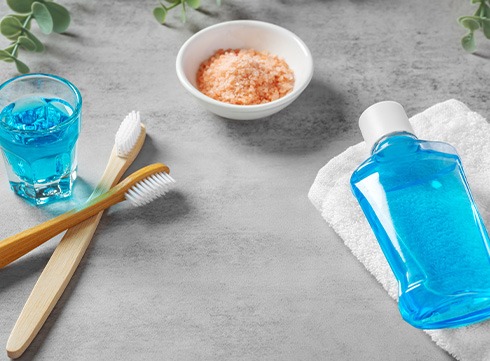
Keeping your mouth clean after your procedure helps prevent a possible infection, but you must be gentle to preserve the blood clot that’s essential for healing. For the first 24 hours, Dr. Garcia might instruct you to skip brushing and flossing because you might damage it. Instead, you can rinse with warm salt water two or three times daily, ideally after eating. It can also be helpful to rinse with a prescription mouthwash, but avoid using anything that contains high levels of alcohol.
Then, the day after surgery, it’s generally safe to resume brushing and flossing as long as you’re careful around your implant.
What to Do After Your New Teeth Are Attached
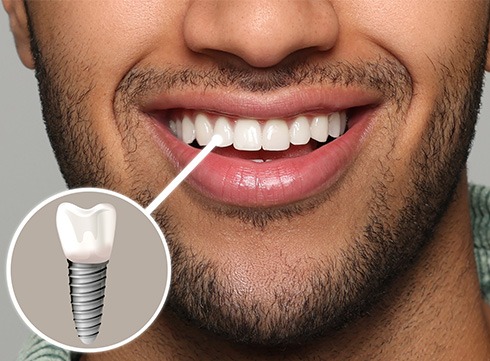
It can take weeks or months for your gums and jaw to heal after dental implant placement. Then, when Dr. Garcia can confirm that you’re ready, we’ll attach your final restoration. If you’re worried this step will cause additional discomfort, you can set your concerns aside. Our team will numb the area with a local anesthetic and can also provide sedation to ensure you remain relaxed. There shouldn’t be any additional bleeding, swelling, or complicated recovery, though you may feel somewhat sensitive for a day or two.
Maintaining & Caring for Your Dental Implants

Indeed, dental implants can make your smile full and healthy for years to come. That said, they’ll only do so if you take proper care of them. Your implants will fail early or need early replacements otherwise. Luckily enough, our team can help prevent this outcome. Below are some helpful tips on dental implant care in Corpus Christi. By reading them over, you’ll grasp how best to maintain your new teeth. So, keep reading or call our office for details!
Make Oral Hygiene a Priority
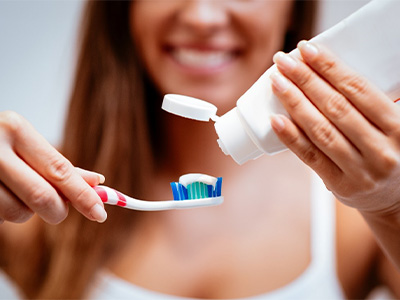
True enough, implants are cavity-proof – their materials don’t erode like enamel. Still, the fact is that you should clean them daily. Failing to do so will lead to long-term problems.
Implants don’t exist in isolation; they’re set next to your natural teeth and gums. As a result, they can be affected by nearby oral issues. Should you get gum disease, the resulting gum recession could loosen your implant. It’d then erode the bone tissue supporting the prosthetic.
Thankfully, you can avoid such implant threats with proper oral hygiene. In particular, just brush twice daily, floss once daily, and rinse with mouthwash often.
Eat a Healthy Diet

Dental implants generally let you eat as you please, but they still have limits. They’ll last longer if you stick to a mouth-healthy diet.
The truth is that some foods are risky for implants. For example, hard foods like pretzels and nuts can chip them. Meanwhile, sticky and sugary things can wedge between implants and decay nearby teeth. These items would then cause oral issues known to trigger implant failure.
In contrast, foods with mouth-healthy nutrients help implants endure. Products with calcium, phosphorus, and vitamin C, especially, will prevent gum disease and strengthen your jaw.
Break Bad Habits

While implants are durable, bad oral habits can cause them to break or fail. As such, you should quit such practices before or soon after treatment.
Take smoking, for instance. Tobacco slows your recovery from implant surgery. It also encourages gum disease, which can trigger implant failure. So, stop this habit at least two weeks before implant placement.
Another habit to quit is chewing hard objects. The action can chip your implants, whether you’re biting a pencil, ice cubes, or your fingernails.
Protect Your Dental Implants
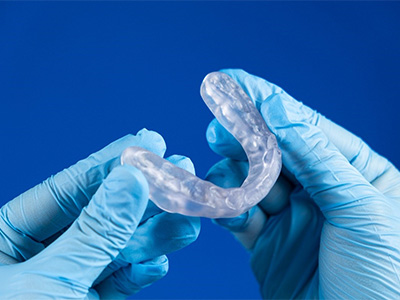
Implants can endure a lot. Still, they aren’t indestructible; they can and will get damaged with enough force. Therefore, protect them with good dental tools.
The best approach for this protection is to wear an oral appliance. With a sports mouthguard, you could protect your restoration from sports-related injuries. Meanwhile, using a nightguard while you sleep would prevent wear and tear from bruxism.
Schedule Regular Dental Checkups

However careful you are, you can’t care for implants alone. There will inevitably be issues you miss. So, try to attend dental checkups and cleanings every six months. Professional care will offer further protection.
Don’t forget: checkups and cleanings stop threats to your implants. After all, they assess your mouth and treat minor issues before they worsen. In doing so, they keep your implants safe.
Dental Implant Failure & Salvage

Did you know that dental implants are successful in more than 95% of cases? That is an impressive statistic! You should feel confident that your new teeth will stand the test of time. However, it is also important to acknowledge that in some rare cases, circumstances arise that lead to dental implant failure. What should you do if you ever suspect that something is amiss with your dental implants? Call our team at South Texas Periodontics & Implants. We will examine your mouth, strive to determine the cause of the problem, and recommend your next steps. We want to get your smile’s health and function back on track ASAP!
Learn More About Dental Implant Failure and Salvage
Advanced Dental Implant Procedures

The dental implant process is individualized for each patient. Some people have a healthy jawbone and are free of risk factors that increase the chances of complications, so their tooth replacement journey is very streamlined. In other cases, patients require advanced procedures to prepare their mouth to support their new teeth. If that is true of you, you can be confident that we will handle every detail of your case with great care and precision. Below, you will find basic information about two preparatory services that we often perform.
Bone Grafting
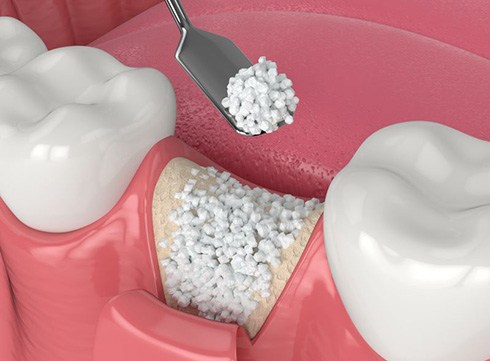
After the loss of natural teeth, the jawbone starts to deteriorate. It becomes thinner and weaker over time. If, because of such deterioration, your jawbone is not strong enough or thick enough to support dental implants, you may need to undergo a bone graft. There are different types of bone grafts, but basically, the procedure goes like this:
- We administer sedation and/or anesthesia to make you comfortable.
- We make incisions in the gums in order to access the underlying bone.
- We add bone material to the jaw. This may come from another part of your body, a human donor, or an animal. In some cases, it is possible to use synthetic bone material. Sometimes, we add small blocks of bones. In other instances, we add bone granules.
- Once the bone is in place, we close the incisions so you can start the healing process.
In some cases, dental implants can be placed during the same appointment as a bone graft. More often, though, a waiting period of a few months is necessary between the two procedures. This allows time for the graft to fully integrate with the surrounding tissue.
Sinus Lift
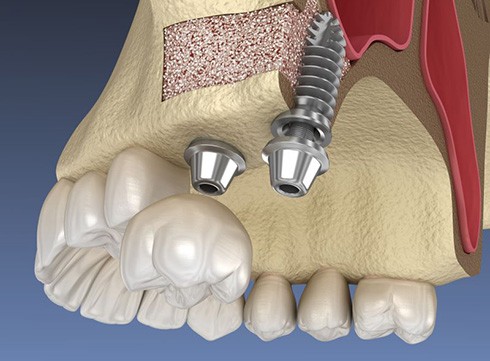
A sinus lift is a special type of bone graft. It is for patients whose upper jaw is not thick enough for dental implants. Without adding bone to the jaw, implants may penetrate the sinus membrane above, which could lead to pain and other complications.
You may need a sinus lift if it has been some time since you lost your natural teeth, your upper jawbone is naturally thin, or you have suffered injuries that have affected the health of your upper jaw.
The procedure itself is pretty straightforward. We carefully access the sinus membrane from below and gently move it upward. Then, we place a bone graft beneath it to keep it in its new place. The gums are closed over the incision cite.
The soft tissue at the site of a sinus lift heals fairly quickly. However, it may take 4 – 9 months for the bone to recover to the point where it is capable of supporting dental implants.
Advanced dental implant procedures could be the key to a successful tooth replacement journey! Our team can give you more details about these services if we determine that they will be a necessary part of your treatment plan.
Dental Implant FAQs
Can I Take Dental Implants Out?
Dental implants are surgically implanted into the jaw and are not designed to be removed on a day-to-day basis. If you need to take out your dental implants, this will require our help.
Some types of implant dentures can be removed for cleaning, but only the prosthetic. Even in this case, the metal posts will still remain in the jaw.
How Long Do Dental Implants Last?
As you can imagine, the longevity of your dental implant has a lot to do with how well you take care of it, along with a variety of other factors. However, provided that you keep up with basic dental hygiene, you can expect your dental implants to last for an incredibly long time.
A majority of dental implants last for over 30 years, and many of them endure for a lifetime! This is several times longer than other methods of tooth replacement.
How Long Does It Take to Recover from Dental Implant Surgery?
Dental implant surgery is fairly low-impact, and most people are able to resume their normal activities as soon as the next day. However, it’s usually a good idea to refrain from strenuous exercise for a few days, as excess blood flow could potentially delay healing.
Be sure to take note of any aftercare instructions that we give you to ensure that you bounce back as quickly as possible.
Can I Get Dental Implants If I Smoke?
While it’s possible for smokers to get dental implants, nicotine and tobacco use can impair the healing process. The suction involved in smoking can pull the emerging clot out of place, causing dry socket. It also restricts blood flow to the mouth.
For these reasons, it’s strongly recommended that you quit smoking for two weeks before and three months after the treatment.
